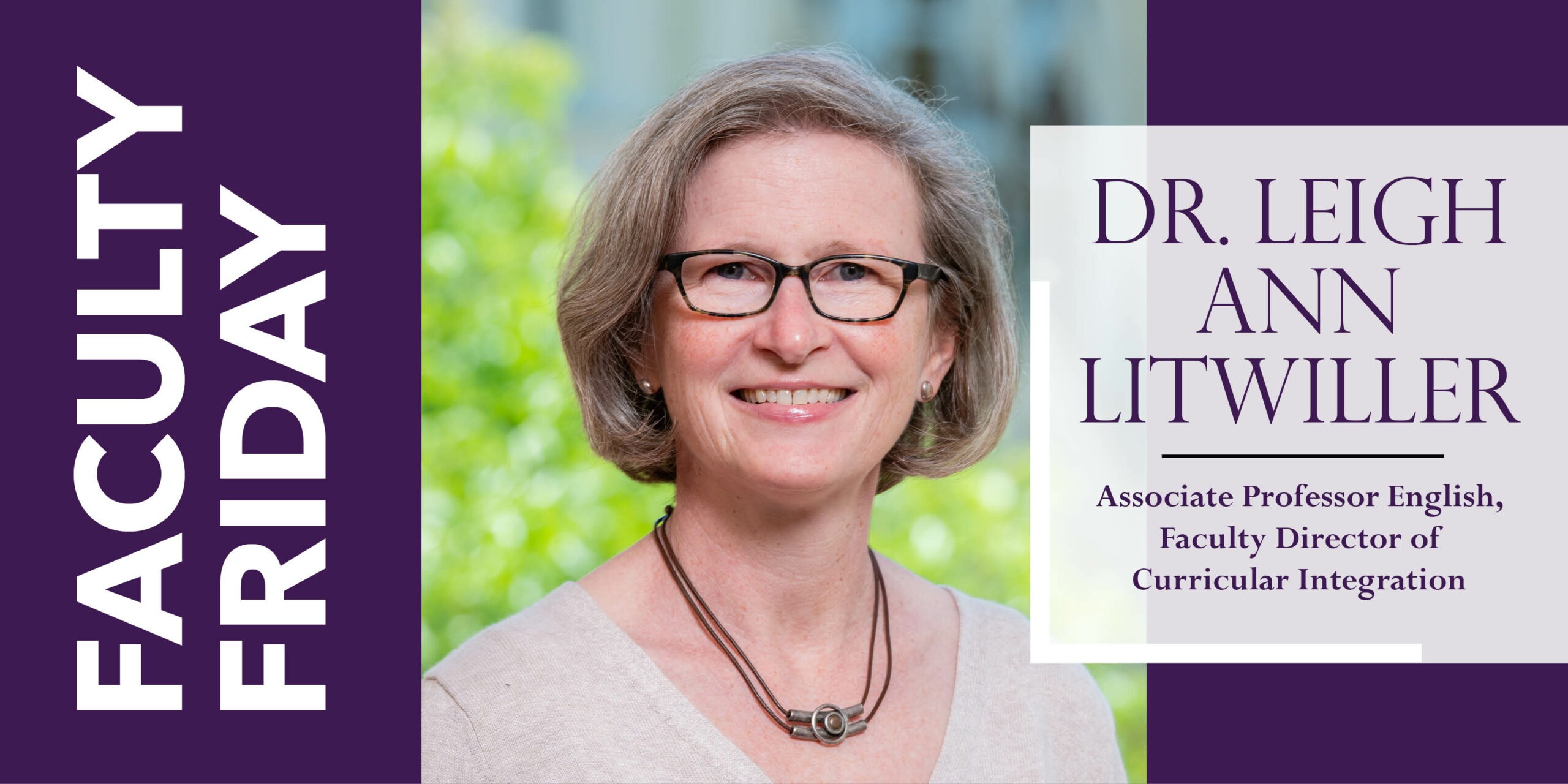
Welcome to Faculty Friday, where we spotlight faculty around Spring Hill College to learn a little more about them, their work, and their story. This week, we catch up with Leigh Ann Litwiller Berte, Ph.D., an associate professor of English.
In addition to her teaching, Dr. Litwiller also serves as the College’s Faculty Director of Curricular Integration, where she is working with other faculty and staff to create the new SHC Pathways program for incoming students.
What class subjects do you teach?
American Literature is my area. I teach some composition and an introduction to fiction classes that I really like. At the upper level, some of my favorite classes are an American drama class where we read 20th and 21st-Century plays. In addition to a Southern Literature class, I also teach a Hemingway-Fitzgerald class. I love teaching Ernest Hemingway and F. Scott Fitzgerald together because their prose styles are so complementary.
What would you say attracted you to the field of teaching?
I was on the debate team in high school, and I was really good at it. I thought I wanted to be a lawyer, and I think I might have been a good one. But I interned at a law firm, and it wasn’t the life I wanted.
I had some fantastic high school teachers, and I thought I wanted to be a high school teacher. I think that’s how you make the biggest difference in the world. I majored in English and started teaching at the high school level. It’s the hardest job I’ve ever done, and I did it for two years, which was an excellent experience. I gained a lot of experience and then went to graduate school at the University of Washington in Seattle. I knew teaching was what I was supposed to be doing, but the level needed clarity.
I love my job here. Even with my new opportunity with the Pathways program and my new role, I would never want to not teach.
What appealed to you about teaching at Spring Hill College?
I just really felt a sense of mission here. I was struck by the service ethic that is so much a part of the Jesuit ideal, and the fact that what we’re doing all this for is not just to get some high paying job or to better one’s self but that you really do have some obligation to use our knowledge in the world for good.
The first time I ever met a priest was when I interviewed with Fr. (Gregory) Lucey, who was the president at Spring Hill College then. He was such a warm and generous and thoughtful human being. He was an inspirational model of what we could all be. The humanity that can be a part of education, you can really feel that here.
What’s your favorite spot on campus?
I know this sounds creepy, but there is a path that leads from the Jesuit cemetery down to this tiny white wooden chapel, called Sodality Chapel. It has tiny pews and a statue of Mary and these bright blue stained glass windows. It’s beautiful, peaceful and simple.
And, of course, the Avenue of the Oaks is always surprising to me how every time you turn down it, it is still really impressive, even if you’ve seen it hundreds of times.
How have the challenges from the pandemic affected your approach as an educator?
I know that online education can be done very well, but I think that for students and for a lot of professors, having a semester online really affirmed the value of what we do in the community with each other in the classroom. I know that sometimes students can be tempted by the convenience online learning seems to offer, and it has its positive uses, but there is real value in being in a room with people.
A college classroom is one of the few spaces I feel like we have left in the world where open dialog actually happens. People haven’t pre-selected who they’re going to enter the room with. It’s a random process of who winds up in there together. The ability to cultivate discussion and exchange in that kind of environment, it’s one of the last civic spaces that is really robust in this world. There is a value in that space, and I don’t think you can replicate the same type of exchange with the same level of humanity online.
What is your most prized possession?
My kitchen has an island in the middle of it, and it is the space that functions as the hub of our home. Our family sits around it and talks. Our friends sit around it with a glass of wine. It’s a social space and a comforting space.
ABOUT SPRING HILL COLLEGE:
Founded in 1830, Spring Hill College is the oldest Catholic college in the Southeast and the third oldest Jesuit college in the United States. Spring Hill combines the Jesuit tradition of excellence in education and a commitment to caring for the whole person – mind, body, and spirit – with innovative educational experiences. Located in Mobile, Ala., Spring Hill’s mission is to form leaders engaged in learning, faith, justice and service for life. As a result, Spring Hill students are engaged, inspired and transformed by their experiences.
- SHC –
